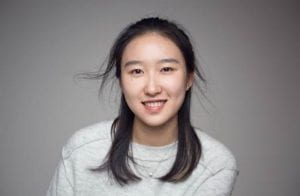Joyce

Joyce decided to use a Summer Undergraduate Research Grant to write a play highlighting women’s stories of migration in modern China. In starting the project, Joyce said, “I wasn’t planning to do my own research when I first met Peter in an advising meeting. I was looking for a URAP position in theatre or humanities, but Peter asked me what I was passionate about (since projects in arts and humanities are usually very specific and creative), and if I had the chance to do my own research, what I would want to do. So I told him about a short play that I wrote during my senior year of high school. I was born and raised in China, but I came to study in the US since high school. Towards the end of high school, I reflected on my journey of moving from one country to another and felt an urge to look for and write about what made who I was. I interviewed women in my family and wrote a two-act play based on their stories to explore the identity of a Chinese woman. From there, Peter encouraged me to think bigger and expand that idea. Since I was also interested in exploring the history of women in contemporary China, and movement and migration is a big part of my personal and my family’s experiences, eventually I decided to conduct research and write a play about families of women under migration in modern China. To collect stories and narratives, I read primary sources including diaries and documentaries and interviewed women from different backgrounds in China.
When asked why she decided on a play, Joyce responded, “I am a theatre major, and I’ve always been interested in playwriting. I think the power of live theatre is that it provides a communal space for the audience to feel, listen, and reflect. It invites the audience to think in the perspective of the characters on stage. Therefore, plays have great potential in pushing for social awareness and change. In Chinese modern drama, female characters rarely take the center stage, and even if when they do, they are often presented as stereotypes who, for example, are in a romantic relationship struggle. We all know that there’s so much more to a woman’s life than just their relationship or her role in a family as a daughter, wife, or mother, but it’s problematic when that’s not what we see on stage. Seeing and presenting woman as her “self”, an individual first, is the perspective that I’m looking into when writing this play. I’m also interested in exploring what challenges Chinese women have had to face in political and social life and how they responded differently. Feminism has been widely discussed on social media in China in recent years, but that’s just a start and there’s so much more work that needs to be done culturally and politically. I think writing a play is what I can contribute to this movement as an artist. There is the personal motivation to express my point of view as a Chinese woman, but also a bigger goal to invite more people to think about women’s situation in China.”
In changing to a remote project, Joyce spoke about what needed to be done– “An adjustment I had to make was changing in-person interviews to a remote setting, but otherwise most of the time I was reading and writing on my own. I think the SURG helped me a lot in developing as a playwright and researcher. Writing a play requires time, patience, discipline, and self-motivation. It’s also a process of constant creation and revisions. Over the summer, I think I gradually found the research and writing method that works for me as a playwright, which helps me to continue developing my play currently. Looking back on it, I probably would give myself more encouragement and patience because generating a play is a time-consuming journey.”

